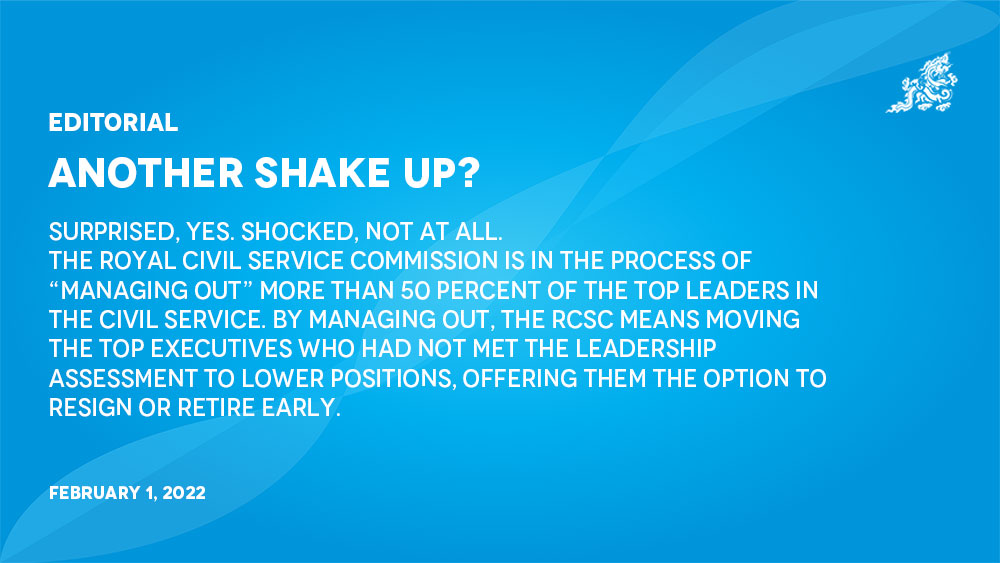Surprised, yes. Shocked, not at all.
The Royal Civil Service Commission is in the process of “managing out” more than 50 percent of the top leaders in the civil service. By managing out, the RCSC means moving the top executives who had not met the leadership assessment to lower positions, offering them the option to resign or retire early.
While the move, an integral part of the civil service reform, came as a surprise, especially with the vacuum created at the top positions, it was not a bombshell dropped on a cold Sunday evening amid the Covid-19 pandemic.
The high-profile civil servants may be the victims of the current exercise, but all this while we knew something as decisive as this was coming. It is in other words, a logical step in the systematic growth of our bureaucracy. The long-awaited reform is a call to finetune the system including taking bold and important decisions.
There had been calls and attempts to reform the bureaucracy. Our memories are short, but we have had exercises and initiatives to make those at the top level accountable and answerable. The performance audits the position classification systems that we launched with great pomp were forgotten after the launch. Such initiatives called for major reforms including assessing personal performance of top leaders and managing nonperformers.
A panel of both local and foreign experts assessed the qualities that would be critical for addressing Bhutan’s challenges going forward. They assessed a range of criteria, in a nutshell, to see if they are fit or relevant to changing times and needs of 21st century Bhutan. The secretaries and the director generals who didn’t meet the expectations are not incompetent, as many assumed after the announcement. They are found not fitting in the context of the larger changes taking place in the country. We need to consider the new scenario in the country and in the world and we need to change and take bold decisions.
Leadership assessment is a useful tool by which governments or leaders ensure performance and promote public accountability. Civil servants are the “servants” of the public. How we serve the public in a fast-changing world would determine the performance of the top-tier servants.
Going by public feedback, the shake up is welcomed. The blame is on systematic flaws within the civil service, which many said protected senior civil servants because of seniority, not by performance or leadership. The individuals, many say, are not to be blamed. The RCSC has rigorous selection procedures. If a majority of the top echelon of the bureaucracy are found not to “meet the expectations”, the flaw is in the system. It is like one said, certifying the product and then complaining about it.
However, the RCSC’ decision should leave an indelible impression on the civil service and how they function. A job in the civil service is taken for granted because of the security. This is dangerous because no hard decisions are taken notwithstanding performance at all levels. This should change. Gone are the days of basking in the assurance of a lifetime job in the civil service at all ranks.
A change with this exercise is that the assessment of performance started from the top. This is a fine example of performance auditing and making their achievements made known to the public. Then would come the director generals and directors and other civil service leaders down the line.


